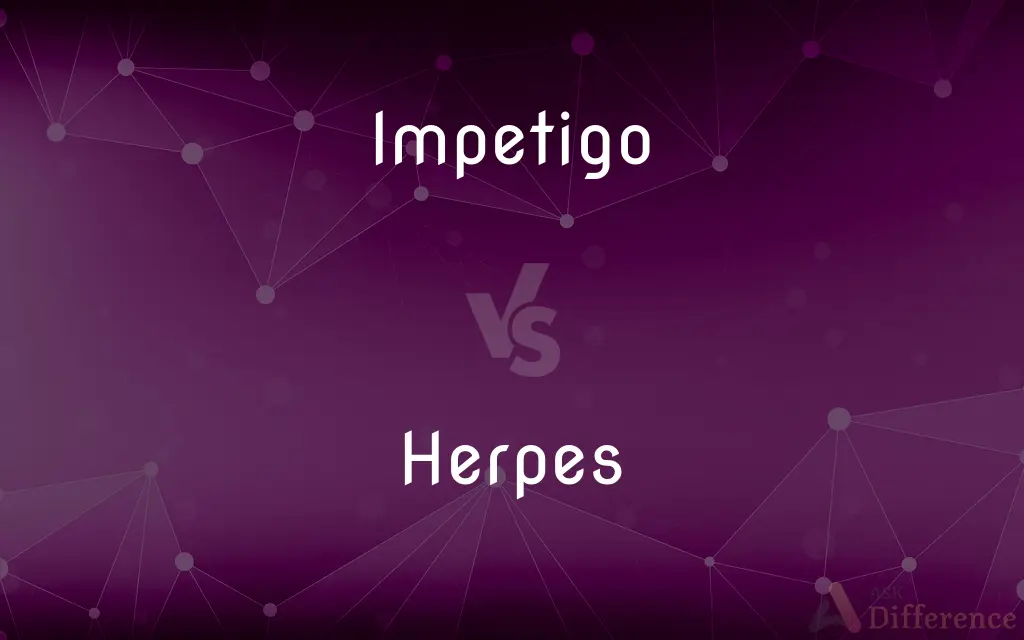Impetigo vs. Herpes — What's the Difference?
Edited by Tayyaba Rehman — By Fiza Rafique — Published on December 20, 2023
Impetigo is a contagious bacterial skin infection causing sores, while Herpes is a viral infection causing recurrent blisters.

Difference Between Impetigo and Herpes
Table of Contents
ADVERTISEMENT
Key Differences
Impetigo is a common skin infection predominantly affecting children, especially in warm and humid environments. On the other hand, Herpes is caused by the herpes simplex virus, which remains dormant in the body and can reactivate multiple times.
While Impetigo typically presents as red sores that burst, crust over, and eventually heal, Herpes manifests as painful blisters or ulcers, often around the mouth or genitals.
Impetigo is primarily spread through direct contact with the sores or with items touched by an infected person. In contrast, Herpes can be transmitted through intimate contact, even when there are no visible symptoms.
Treatment for Impetigo usually involves antibiotics, either topical or oral, depending on the severity. Herpes, being viral, is managed with antiviral medications to reduce symptoms and frequency of outbreaks.
While Impetigo is typically a short-lived infection that doesn't recur once treated, Herpes is a lifelong condition due to the nature of the virus, even if symptoms are not always present.
ADVERTISEMENT
Comparison Chart
Causative Agent
Bacteria (usually Staphylococcus or Streptococcus)
Herpes Simplex Virus
Typical Presentation
Red sores that burst and crust over
Painful blisters or ulcers
Transmission
Direct contact with sores or contaminated items
Intimate contact, even without visible symptoms
Treatment
Antibiotics
Antiviral medications
Recurrence
Typically doesn't recur after treatment
Lifelong, can reactivate multiple times
Compare with Definitions
Impetigo
A contagious bacterial skin infection.
The child's face showed signs of Impetigo with crusty sores.
Herpes
Can present as oral or genital lesions.
He was diagnosed with genital Herpes after noticing painful blisters.
Impetigo
Can spread through contact.
Sharing towels can spread Impetigo among family members.
Herpes
Remains dormant in the body between outbreaks.
Stress can trigger a Herpes outbreak in some individuals.
Impetigo
Commonly affects children's skin.
Schools often see outbreaks of Impetigo among younger students.
Herpes
A viral infection causing recurrent blisters.
Cold sores on the lips are a form of Herpes.
Impetigo
Treatable with antibiotics.
The doctor prescribed a cream to treat the Impetigo.
Herpes
Caused by the herpes simplex virus.
Herpes simplex virus type 1 is often responsible for oral outbreaks.
Impetigo
Manifests as bursting sores that crust over.
Her leg was covered with the crusty patches characteristic of Impetigo.
Herpes
Managed with antiviral medications.
She took antiviral pills to reduce her Herpes symptoms.
Impetigo
A contagious skin infection, usually of children, that is caused by staphylococcal or streptococcal bacteria and is marked by superficial pustules and thick yellow crusts, commonly on the face.
Herpes
Any of several viral infections marked by the eruption of small vesicles on the skin or mucous membranes, especially herpes simplex.
Impetigo
(pathology) A contagious bacterial skin disease forming pustules and yellow crusty sores, chiefly on the face and hands. It is common in children and infection is often through cuts or insect bites.
Herpes
(medicine) A viral infection, caused by Human alphaherpesvirus 1 and Human alphaherpesvirus 2, marked by painful, watery blisters in the skin or mucous membranes or on the genitals.
Impetigo
A cutaneous, pustular eruption, not attended with fever; usually, a kind of eczema with pustulation.
Herpes
An eruption of the skin, taking various names, according to its form, or the part affected, caused by a herpesvirus infection; especially, an eruption of vesicles in small distinct clusters, accompanied with itching or tingling, including shingles, ringworm, and the like; - so called from its tendency to creep or spread from one part of the skin to another.
Impetigo
A very contagious infection of the skin; common in children; localized redness develops into small blisters that gradually crust and erode
Herpes
Viral diseases causing eruptions of the skin or mucous membrane
Herpes
Any of the animal viruses that cause painful blisters on the skin
Common Curiosities
How is Herpes transmitted?
Herpes is transmitted through intimate contact, often even without visible symptoms.
Is Impetigo viral or bacterial?
Impetigo is a bacterial infection.
How can Impetigo be prevented?
Good hygiene, avoiding close contact with infected individuals, and not sharing personal items.
Can adults get Impetigo?
Yes, while more common in children, adults can also contract Impetigo.
Is Impetigo contagious?
Yes, Impetigo is highly contagious.
What bacteria cause Impetigo?
Typically, Staphylococcus or Streptococcus bacteria.
Are there complications associated with Impetigo?
Rarely, untreated Impetigo can lead to complications like cellulitis.
Is there a cure for Herpes?
No, there's no cure, but antiviral medications can manage symptoms.
Can Herpes affect areas other than the mouth and genitals?
Yes, it can affect other areas, but oral and genital regions are most common.
Are cold sores a type of Herpes?
Yes, cold sores are caused by the herpes simplex virus, usually type 1.
Can a person with Impetigo swim in a pool?
No, someone with Impetigo should avoid swimming until fully treated to prevent spreading.
How long do Herpes outbreaks last?
Typically, a week to ten days, but it can vary.
Can Impetigo leave scars?
Generally, it doesn't, but scratching might lead to scarring.
How many types of herpes simplex viruses exist?
Two main types: HSV-1 (usually oral) and HSV-2 (usually genital).
Can you get Herpes without intimate contact?
Yes, it's possible through non-intimate close contact, but less common.
Share Your Discovery

Previous Comparison
CMMI vs. TMMI
Next Comparison
Quarter Pound vs. WhopperAuthor Spotlight
Written by
Fiza RafiqueFiza Rafique is a skilled content writer at AskDifference.com, where she meticulously refines and enhances written pieces. Drawing from her vast editorial expertise, Fiza ensures clarity, accuracy, and precision in every article. Passionate about language, she continually seeks to elevate the quality of content for readers worldwide.
Edited by
Tayyaba RehmanTayyaba Rehman is a distinguished writer, currently serving as a primary contributor to askdifference.com. As a researcher in semantics and etymology, Tayyaba's passion for the complexity of languages and their distinctions has found a perfect home on the platform. Tayyaba delves into the intricacies of language, distinguishing between commonly confused words and phrases, thereby providing clarity for readers worldwide.














































